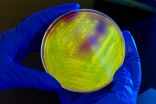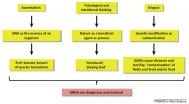DBT dramatically improves cancer detection rate in dense breast tissue
2015-04-24
(Press-News.org) Leesburg, VA, April 24, 2015--Digital breast tomosynthesis (DBT) increases the rate of cancer detection in women with dense breast tissue by as much as 67%, according to new research from the Einstein Medical Center in Philadelphia.
"There are a lot of data showing that screening with DBT increases cancer detection, but much less is known about the effect of density and lesion type on detection rates," said coauthor Caroline Ling. "We found a striking increase in detection among women with dense breasts called back for mass and asymmetry relative to nondense breasts."
The study was presented at the ARRS 2015 Annual Meeting in Toronto.
View the abstract
INFORMATION:
ELSE PRESS RELEASES FROM THIS DATE:
2015-04-24
Functional analysis of a cell, which is the fundamental unit of life, is important for gaining new insights into medical and pharmaceutical fields. For efficiently studying cell functions, it is essential to reconstruct cellular microenvironments by parallel manipulation of single cells. Various cell manipulation techniques including fluidic, optical, and electrical techniques have been developed.
However, all these techniques lack flexibility with respect to changes in the cellular types, number, and places. In addition, the manipulations, which have been conducted in ...
2015-04-24
While seeking targets to attack Huntington's disease, an incurable inherited neurodegenerative disorder, neurobiologists of the research group led by Professor Erich Wanker of the Max Delbrück Center for Molecular Medicine in the Helmholtz Association found what they were looking for. Using a filtering strategy borrowed from criminologists, the researchers systematically filtered interaction networks of various biological databases. In several steps, they increasingly narrowed down their search until they ultimately found the protein (CRMP1). In subsequent lab experiments ...
2015-04-24
Dropping off a child at kindergarten for the first time can be one of the most memorable yet terrifying experiences of parenthood. Among the many concerns parents face is the worry whether your child will make friends - a key factor, research shows, in reducing anxiety, depression and the likelihood of being bullied.
For parents of children with disabilities, the concern is even greater as four-out-of-10 of their children will enter kindergarten without the social skills necessary to develop close friendships. The response from schools has been to create inclusive classrooms, ...
2015-04-24
A new technique that identifies how genes are controlled could help scientists spot errors in the genetic code which trigger disease, a study suggests.
The method focusses on those parts of DNA - known as enhancer regions - which regulate the activity of genes and direct the production of proteins that have key functions within the body.
Errors in protein production can result in a wide range of diseases in people, researchers say.
The new method could help researchers pinpoint the source of disease-causing mutations in enhancers. Until now, these genetic errors ...
2015-04-24
ANN ARBOR, Mich. -- Nearly half of American hospitals aren't taking key steps to prevent a kind of gut infection that kills nearly 30,000 people annually and sickens hundreds of thousands more - despite strong evidence that such steps work, according to a new study.
While nearly all of the 398 hospitals in the study use a variety of measures to protect their patients from Clostridium difficile infections, 48 percent haven't adopted strict limits on the use of antibiotics and other drugs that can allow the dangerous bug to flourish, the researchers report.
Hospital ...
2015-04-24
This news release is available in German. The world is a risky place. But our subjective fears and anxieties are often at odds with the evidence. New findings by scientists at the Max Planck Institute for Human Development and the University of Konstanz show that subjective fears about potential risks may be amplified in social exchange. Their findings have now been published in the journal Proceedings of the National Academy of Sciences (PNAS).
In our information society, information about risks such as Ebola and measles can spread like wildfire - be it through ...
2015-04-24
A team of Belgian philosophers and plant biotechnologists have turned to cognitive science to explain why opposition to genetically modified organisms (GMOs) has become so widespread, despite positive contributions GM crops have made to sustainable agriculture. In a paper published April 10 in Trends in Plant Science, they argue that the human mind is highly susceptible to the negative and often emotional representations put out by certain environmental groups and other opponents of GMOs. The researchers urge the general public to form opinions on GMOs on a case-by-case ...
2015-04-24
DURHAM, N.C. -- Orphaned children in low- and middle-income countries face a high risk of trauma, with physical and sexual abuse being by far the most prevalent traumatic events.
New research shows that orphaned boys in these settings are just as likely to experience abuse as girls. As a result, the study authors suggest targeting more support services and prevention programs toward protecting vulnerable boys.
Researchers from Duke University and the University of North Carolina at Chapel Hill found that physical and sexual abuse affects 12 percent of girls and 14 ...
2015-04-24
Thinking "time is money" can be a barrier for people to act in environmentally friendly ways, even for tasks like recycling that take mere seconds, according to UBC research.
As Earth Day approaches on April 22, this dynamic has led to an unsettling outcome.
"Putting a price tag on time leaves individuals to focus on their own needs and goals, as opposed to the needs and goals of others, including the environment," says Ashley Whillans, PhD student in UBC's Department of Psychology and lead author of a paper on the subject.
In one of the paper's studies, a group of ...
2015-04-24
The gold standard for analyzing the behavior of fusion plasmas may have just gotten better. Mario Podestà, a staff physicist at the U.S. Department of Energy's Princeton Plasma Physics Laboratory (PPPL), has updated the worldwide computer program known as TRANSP to better simulate the interaction between energetic particles and instabilities - disturbances in plasma that can halt fusion reactions. The program's updates, reported this week in the journal Nuclear Fusion, could lead to improved capability for predicting the effects of some types of instabilities in future ...
LAST 30 PRESS RELEASES:
[Press-News.org] DBT dramatically improves cancer detection rate in dense breast tissue



